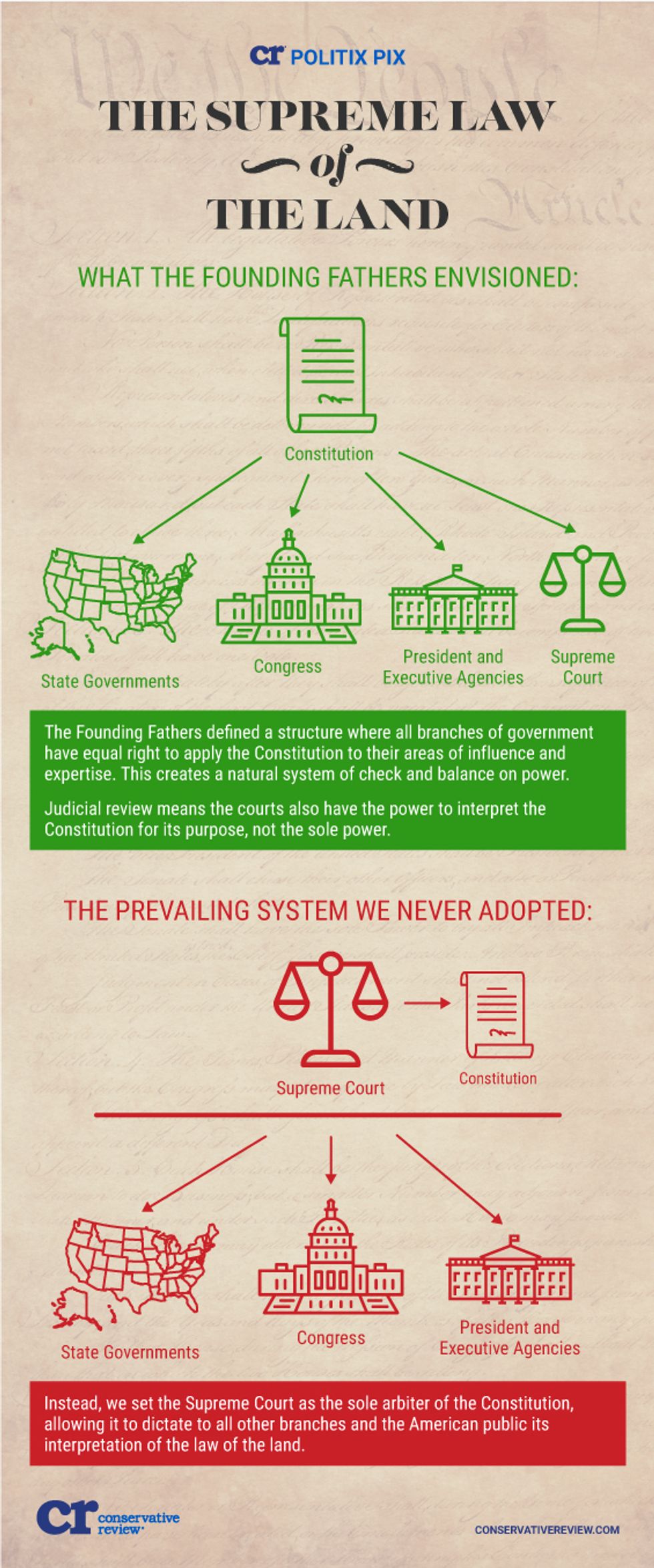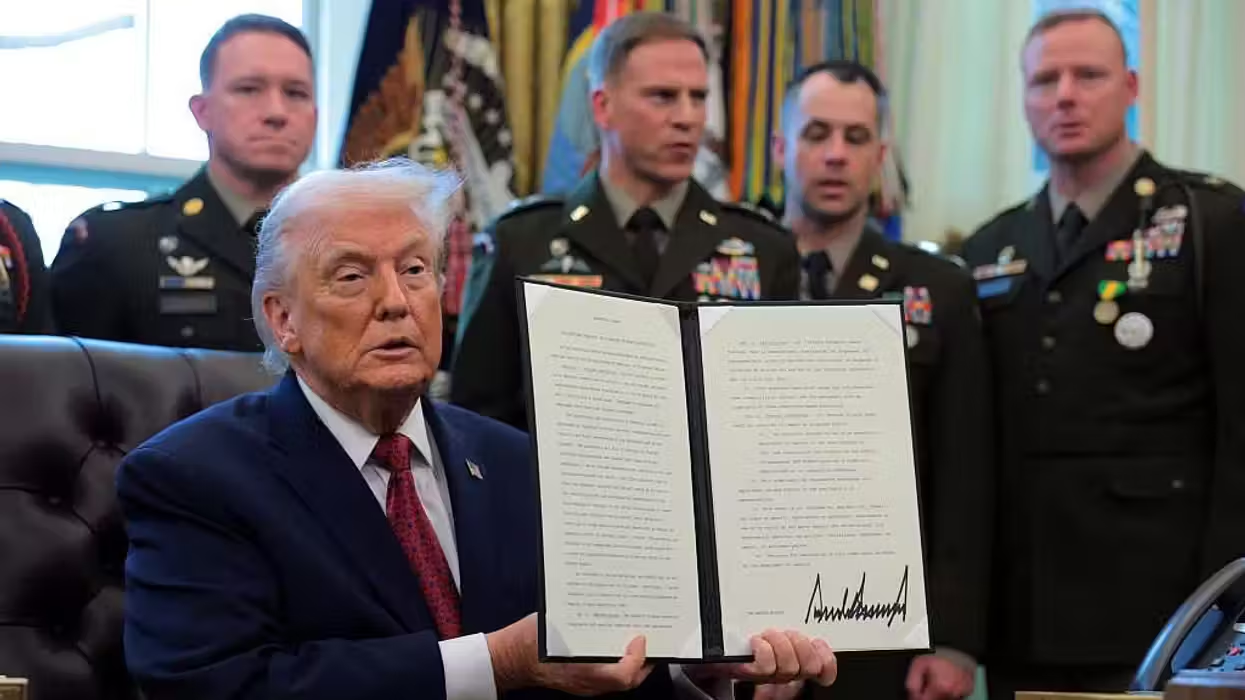
© 2025 Blaze Media LLC. All rights reserved.
The entire problem with our confirmation process and judiciary was summed up when Sen. Mike Lee prefaced his opening statement at the Kavanaugh hearings by observing the insanity of so much angst and acrimony in the room over a single judicial appointment. But while several other senators were on message about the need to debate the role of the judiciary, none of them fully identified the cause of judicial supremacism, what it actually is and isn’t, and what the solution should be.
A basic misunderstanding of who interprets the Constitution
One after another, Republican senators kept using the bromides such as, “We need judges, not politicians” and “We need those who will interpret the law and the Constitution, not rewrite it.” The problem is that Democrats believe their judges are interpreting the Constitution. They believe that self-defense is not in the Constitution but gay marriage and a right to immigrate are in the Constitution. So, the next logical question is, who is the final say in interpreting the Constitution?
This is a question that was not addressed by any senator at the hearing. Anyone who understands the difference between judicial supremacy and judicial review would recognize that each branch has a co-equal power to determine political outcomes based on constitutional interpretations — and the judiciary holds the weakest power.
It all comes down to this chart: which system of government did we adopt?
Almost every Democrat pounded the table, predicting that this single judge will determine the outcome of every major political issue and affect America for generations. “If confirmed, with the stroke of a pen, a nominee may impact their lives for a generation or more,” warned Senator Pat Leahy. “You would help shape the future of this country and have an impact on the lives of millions of Americans for literally decades to come,” said Senator Chris Coons, lecturing Kavanaugh. “I will not cast a vote more important than this one,” bemoaned Senator Richard Blumenthal, a man known for hyperbole.
But if our system of government was working properly, none of this would be true. Whether the Supreme Court had decided a case that determined a conservative or liberal policy preference, it wouldn’t have all that much impact if the other branches pushed back against it when they disagreed. It wasn’t until Cooper v. Aaron that the court transmogrified judicial review into judicial supremacy – the notion that every court opinion is self-executing and universally binding on all non-parties and the other branches of government as the final say on the matter.
Now, with the Supreme Court hearing just 60 cases, fewer cases than ever, and the lower courts hearing more cases than ever, the ACLU essentially controls the outcome of most issues based on forum-shopping, and the lower courts remain the final word on the matter.
Sen. Ben Sasse gave a terrific opening statement on how we accord too much power to the courts, but, in my view, he wrongly identified congressional deference to the executive branch as the culprit for judicial supremacy. While delegation to the administrative state is certainly a problem in its own right, most of the worst cases creating phony rights have nothing to do with vague statutes, but with completely remaking the Constitution and vesting the sole and final authority of such interpretation with the courts. Democrats believe that the entire agenda of the Democrat Party is already ensconced in the federal Constitution, most prominently the Fourteenth Amendment, which is why every important cause automatically goes to federal court.
Every Republican, even while lamenting legislating from the bench, is still acceding to the premise that the federal courts are the final say on all constitutional issues.
Even Kavanaugh, in his opening statement, used the platitudes of the courts being “the crown jewel of our constitutional republic” and the “last line of defense for the separation of powers, and the rights and liberties guaranteed by the Constitution.” That is simply not true, and it is the culprit that is continuing to fuel the Democrat duplicity on the courts. The courts were never intended to be and ought not be the “last line” of defense, especially on separation of powers. As James Madison said, “the several departments being perfectly co-ordinate by the terms of their common commission, neither of them, it is evident, can pretend to an exclusive or superior right of settling the boundaries between their respective powers.” Hence, the courts are but one line of defense; an important one, but comparatively the weakest one.
Make state judiciaries great again
If Democrats are truly fearful of a coming conservative Supreme Court, now is the time for a grand bargain, where Congress passes legislation exercising its Art. III Sec. 2 powers to finally strip the federal courts of power to adjudicate nakedly political issues. This would apply equally to marriage, religious liberty, and abortion as it does to guns and campaign finance.
So, what happens if these cases are removed from the federal courts? Would litigants not be able to bring lawsuits? Hardly. These issues would return to the state courts. Thus, even if we continue to suffer from judicial activism, it would be a much more transparent and redressable problem, because state judges are elected and more accountable to legislatures than the federal courts are to Congress.
Why does all of the power on important political issues reside in the federal judiciary, the most unaccountable and out-of-control area of government? The case of West Virginia’s legislature impeaching all of the members of its state supreme court should provide a superlative glimpse into the need to restore more judicial power to the states, where the courts are more accountable and the legislatures are more effective.
Last month, the West Virginia House of Delegates took the unprecedented step of impeaching all four remaining justices on the state supreme court. The fifth justice had already stepped down because of corruption charges. Regardless of one’s political views or affiliation, this is a welcome reassertion of the people’s power through their elected representatives to finally get back on the playing field and exercise oversight over a runaway judiciary. Where Congress has failed for years to impeach judges, a state is now impeaching its entire supreme court. There’s an important lesson to take from this.
A patchwork of law is better than uniform tyranny
Ironically, the Supremacy Clause of the Article VI, which is erroneously used to justify federal judicial supremacy rather than constitutional supremacy, specifically directs state judges to interpret the Constitution as the supreme law of the land. Imagine if we returned this power to the state judges. We would no longer suffer under the fear of a single federal judge “shaping our society for a generation,” as Democrats so indignantly observed at the hearing. We would have, as Sixth Circuit Court of Appeals Judge Jeffrey Sutton said in his recent book, “51 imperfect solutions” to constitutional law rather than just one tyrannical solution.
It’s even more important than simply diffusing power so that all 50 states don’t have to suffer from one political judgement of a single court until the end of times. It’s that state judiciaries, for the most part, are elected. Inevitably, given the polarization of our society, we not only disagree on policy but the Constitution itself. This is why any case implicating a constitutional right will invariably be political. Thus, if we are going to place politics in the courts, it’s better to do it in the bodies that are elected and closer to the people.
Also, it is clear from the West Virginia case that state courts are not nearly as intimidating to state legislatures as federal courts are to Congress. When state courts issue bad consequential opinions, not only will the impact be limited to that state, but even within the state it is more likely that the other branches will assert their co-equal powers, pursuant to their respective state constitutions, than the other branches of the federal government do to the federal courts following radical federal court opinions. Unlike Congress, state legislatures are more likely to use impeachment against wayward judges appointed by both parties.
Collectively, this will make state judicial elections great again and will make state legislatures more consequential and powerful. If we are going to have the courts decide every election law and social issue, let’s at least have this debate at the local level.
This is really what the Founders intended. Indeed, John Marshall promised the 1788 Virginia Ratifying Convention that the federal judiciary would not be vested with the power to overturn state laws. Also, it wasn’t until 1875, in the twilight of the Reconstruction era, that Congress transferred authority over most constitutional questions from state courts to lower federal courts, and it wasn’t until 1914 that Congress granted the Supreme Court appellate jurisdiction over all cases heard by state supreme courts. The Judiciary Act of 1789 limited the Supreme Court’s jurisdiction to state cases that ruled against a federal right. But as it related to individual cases not involving interstate litigation, the state courts had the final say in upholding a state or federal statute for the first century of the republic.
Thus, most constitutional questions were decided by state courts until 1875, and the Supreme Court rarely took appeals on federal questions that started in the states until 1914. And that was when litigation implicating a federal right was based on real rights, not BS manufactured rights. There’s an even more compelling case for Congress to take from the federal courts what it gave after the Civil War, given that so many of these federal constitutional cases are frivolous.
As I observed in “Stolen Sovereignty”, naysayers will howl about the side effects of returning jurisdiction in some cases to the states. They will complain about the disjointed patchwork of jurisprudence and legal opinions that will ensue as a result of transferring power from the federal court system to the fifty systems of the individual states. But have we not reached the nightmare scenario already when unelected life-tenured judges control our entire lives and both sides are at each other’s throats over it? There is no ideal solution to the violence that has been foisted upon our constitutional system of governance over the past half-century, but it’s better to live under a patchwork of decisions that can be redressed at the ballot box than under one federal oligarchy that can immutably transform society without any recourse for the citizenry.
#mc_embed_signup{background:#fff; clear:left; font:14px}
/* Add your own MailChimp form style overrides in your site stylesheet or in this style block.
We recommend moving this block and the preceding CSS link to the HEAD of your HTML file. */
Want to leave a tip?
We answer to you. Help keep our content free of advertisers and big tech censorship by leaving a tip today.
Want to join the conversation?
Already a subscriber?
Blaze Podcast Host
Daniel Horowitz is the host of “Conservative Review with Daniel Horowitz” and a senior editor for Blaze News.
RMConservative
Daniel Horowitz
Blaze Podcast Host
Daniel Horowitz is the host of “Conservative Review with Daniel Horowitz” and a senior editor for Blaze News.
@RMConservative →more stories
Sign up for the Blaze newsletter
By signing up, you agree to our Privacy Policy and Terms of Use, and agree to receive content that may sometimes include advertisements. You may opt out at any time.
Related Content
© 2025 Blaze Media LLC. All rights reserved.
Get the stories that matter most delivered directly to your inbox.
By signing up, you agree to our Privacy Policy and Terms of Use, and agree to receive content that may sometimes include advertisements. You may opt out at any time.







